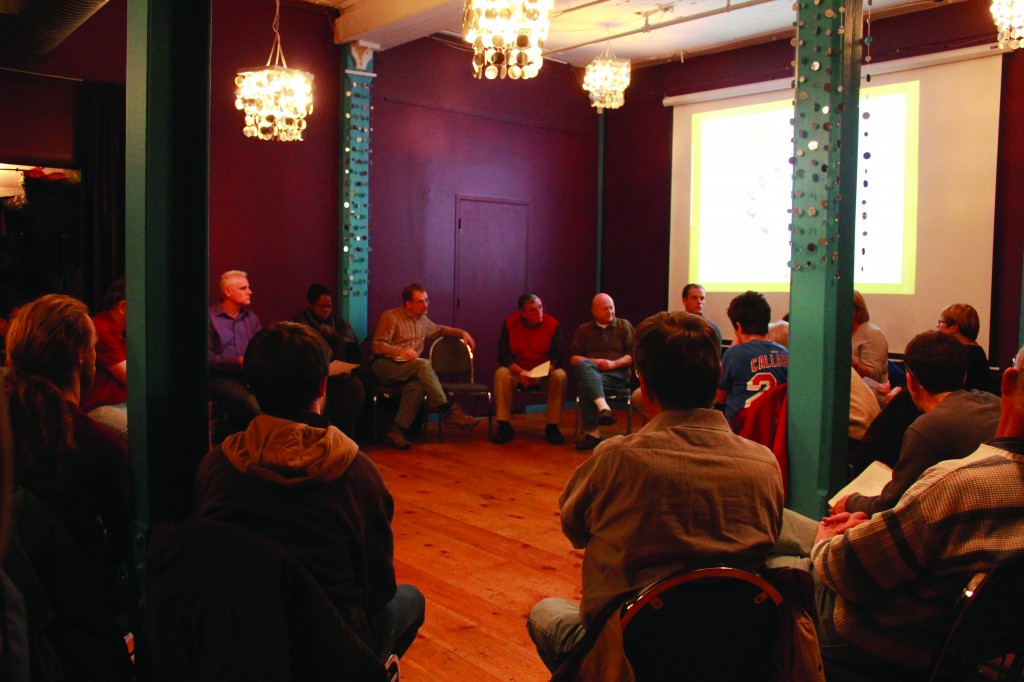
The Violet Room at the Lost Dog Café was filled Tuesday evening with talk about programs that fight hunger in Broome County and the surrounding area.
Speakers from the Food Bank of the Southern Tier, Board of Cooperative Educational Services (BOCES) Food Service Department and the city of Binghamton addressed how their respective programs work to ensure that no one in Broome County goes hungry.
One upcoming program that was discussed was the Many Hands Food Co-op, set to open in 2014. The Co-op will provide basic groceries and healthy products to Binghamton residents, encouraging them to buy healthy foods while also supporting local farmers and creating jobs.
Natasha Thompson, CEO and president of Food Bank of the Southern Tier, began the evening by pointing out the silent nature of hunger in the United States.
“When we talk about hunger in the United States, we’re really talking about what’s known as food insecurity,” Thompson said. She explained that when households finish paying housing, transportation, day care and medical expenses, “they may or may not have enough money at the end of the month to pay for food.”
Thompson’s pantry serves six counties, which include Ithaca and Binghamton. In these areas alone, 72,000 people live at or below the poverty line with 35,000 children getting free or reduced price lunches.
To provide each Broome County citizen living below the poverty line with one meal a day would require over seven million pounds of food, according to Thompson.
“Last year my food bank distributed 7.8 million pounds here in the region with almost two million going to Broome County, so you can see that there is a tremendous gap,” Thompson said.
Ray Denniston, special project coordinator at Broome-Tioga BOCES Food Service Department and a member of the NYS Food Policy Council, shared a story about a small boy who came to a summer program for kids who need the assistance of school food programs outside of the academic year.
Once all the other children were gone, the boy would take the excess sandwiches home to his siblings so that there would be food for the weekend and his mother wouldn’t have to go to bed hungry.
“He just kind of looked at me and said, ‘You know Mr. Denniston, someday it’s going to get better,’ and he just stared at me, and I still remember that kid’s face, and I still remember his eyes,” Denniston said. “When he stared at me, he wasn’t waiting for me to say, ‘Yep, things are going to be better.’ He was challenging me to make his and their lives better.”
Lea Webb, city of Binghamton councilwoman and managing principal of Webb Consulting and the Half a Loaf initiative, described the idea of “food deserts” and how they contribute to hunger in Binghamton.
Webb defined a food desert as “a community where residents encounter geographic and economic hurdles to access nutritional food, or areas where at least 20 percent of inhabitants live below the federal poverty level and 33 percent live more than a mile away from a grocery store.”
Webb pulled up a map that divided the Binghamton area into income levels, food deserts and soup kitchen and pantry locations. Deserts have the lowest level of income, but many soup kitchens and pantries are located outside of deserts with limited transportation options to get to said places.
“About 23 percent of children in Broome County under the age of 18 live in poverty, and in the city of Binghamton alone 42 percent of all children live in poverty which is double the state average of 20 percent,” Webb said.
Evan Greenberg, an undeclared freshman, said he was moved by the energy in the room Tuesday evening.
“The amount of brainpower within the intelligent people in the room and the amount of passion was really inspiring,” Greenberg said. “I’d like to get involved with [the programs showcased]; it seems like it’d be a very good thing to go into.”
The event was part of the Community Lab series, hosted by Binghamton Regional Sustainability Coalition Director David Currie and Binghamton University professor David Sloan Wilson, which takes place on the third Tuesday of each month and tackles different community issues.


